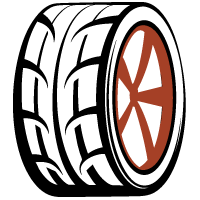2003 Kia Optima Wheel fitment guide Find out what wheels and tires fit 2003 Kia Optima

2003 Kia Optima I (MS) Facelift [2002 .. 2006] - Modifications
Kia Optima I (MS) Facelift [2002 .. 2006] 2.4i
149 hp- Generation: I (MS) Facelift [2002 .. 2006] [USDM]
- Production: [2002 .. 2006]
-
Sales regions: USA+
-
Power: 149 hp | 111 kW | 151 PS
- Engine: , Petrol
-
Center Bore / Hub Bore:
-
Bolt Pattern (PCD): ()
-
Wheel Fasteners: Lug nuts
-
Thread Size:
-
Wheel Tightening Torque:unknown
| Tire | Rim | Offset Range mm | Backspacing mm inches | Tire Weight kg lb |
|
||
|---|---|---|---|---|---|---|---|
| OE 195/70R14 90H | 5.5Jx14 ET46 | 44 - 48 | 129 5.08 | 10.3 22.8 | 2.1 30 |
OE
|
|
| 205/60R15 90H | 6Jx15 ET46 | 135 5.31 | 10.3 22.6 | 2.1 30 |
|
||
| 205/55R16 89V | 6.5Jx16 ET36 | 131 5.16 | 10.0 22.1 | 2.1 30 |
|
Kia Optima I (MS) Facelift [2002 .. 2006] 2.5i
170 hp- Generation: I (MS) Facelift [2002 .. 2006] [USDM]
- Production: [2002 .. 2006]
-
Sales regions: Oceania
-
Power: 170 hp | 127 kW | 173 PS
- Engine: , Petrol
-
Center Bore / Hub Bore:
-
Bolt Pattern (PCD): ()
-
Wheel Fasteners: Lug nuts
-
Thread Size:
-
Wheel Tightening Torque:unknown
| Tire | Rim | Offset Range mm | Backspacing mm inches | Tire Weight kg lb |
|
||
|---|---|---|---|---|---|---|---|
| OE 205/60R15 90H | 6Jx15 ET46 | 44 - 48 | 135 5.31 | 10.3 22.6 | 2.1 30 |
OE
|
|
| 195/70R14 90H | 5.5Jx14 ET46 | 129 5.08 | 10.3 22.8 | 2.1 30 |
|
||
| 205/55R16 89V | 6.5Jx16 ET36 | 131 5.16 | 10.0 22.1 | 2.1 30 |
|
Kia Optima I (MS) Facelift [2002 .. 2006] 2.7i
178 hp- Generation: I (MS) Facelift [2002 .. 2006] [USDM]
- Production: [2002 .. 2005]
-
Sales regions: USA+
-
Power: 178 hp | 133 kW | 181 PS
- Engine: , Petrol
-
Center Bore / Hub Bore:
-
Bolt Pattern (PCD): ()
-
Wheel Fasteners: Lug nuts
-
Thread Size:
-
Wheel Tightening Torque:unknown
| Tire | Rim | Offset Range mm | Backspacing mm inches | Tire Weight kg lb |
|
||
|---|---|---|---|---|---|---|---|
| OE 90H | 44 - 48 | 135 5.31 | 8.9 19.6 | 2.1 30 |
OE
|
||
| 90H | 129 5.08 | 10.3 22.8 | 2.1 30 |
|
|||
| 89V | 131 5.16 | 10.0 22.1 | 2.1 30 |
|
The size of the hole in the center of a wheel is known as the center bore or centerbore.
- Recommended for winter
- Run-flat tires
- Link comes to the calculator page for comparison
- Steel wheels
OE - Original Equipment
![]() - Tire Pressure
- Tire Pressure
![]() - Front axle
- Front axle
![]() - Rear axle
- Rear axle
Offset is the distance in millimetres from the centre line of the wheel to the wheel’s mounting face. Given that the mounting face can be either in front of or behind the centreline, the offset can be either neutral, positive or negative.
The Pitch Circle Diameter (PCD) is the diameter of the circle which passes through the centre of all the studs, wheel bolts or wheel rim holes
hp - Mechanical horsepower
kW - Kilowatts
PS - Metric horsepower
Wheel backspace is the distance from a wheel's mounting surface to the back edge of the wheel.
Tire pressure is a vehicle's recommended cold tire inflation pressure. It is measured in bars or PSI (pounds per square inch).
A sales region is a global automotive region in which a vehicle was officially sold or is still being sold.
Ex.: 7J x 15 Rim width (inches) x rim diameter (inches)
ISO standard Ex.: M12 x 1.25 Nominal diameter (mm) x pitch (mm)
UN-series Ex.: 9/16" - 18 UNF
Thread size (in) - thread pitch
UNF - Unified National Fine Thread
Example: 215/55 R16 91 T
215 is the tire width in mm
55 is the ratio of profile height to width or simply 'profile'. With the same width, the larger this indicator, the higher the tire will be and vice versa
16 - diameter of the wheel (disk) in inches. (It is the diameter, not the radius!). This is the inner size of the tire or the outer size of the rim
91 - load index. This is the level of maximum permissible load on one wheel
T - tire speed index
The method of attaching a wheel to a hub: wheel nuts or wheel bolts
The torque value specified by the manufacturer for wheel bolts or wheel nuts, which is to be set when tightening on the torque tool (torque setting). A rotational force given in Newton metres (Nm) or foot-pounds (ft-lbs), wheel torque measures lug nut / bolts tightness
Rating
The tires included with a new vehicle when it is purchased. OE tires are specifically chosen by the vehicle manufacturer to make the most of the vehicle's performance characteristics.

![Kia Optima I (MS) Facelift [2002 .. 2006] [USDM] Kia Optima I (MS) Facelift Saloon](https://cdn.wheel-size.com/thumbs/58/f3/58f38c4f2ff1627cd2896aa290b23b37.jpg)








